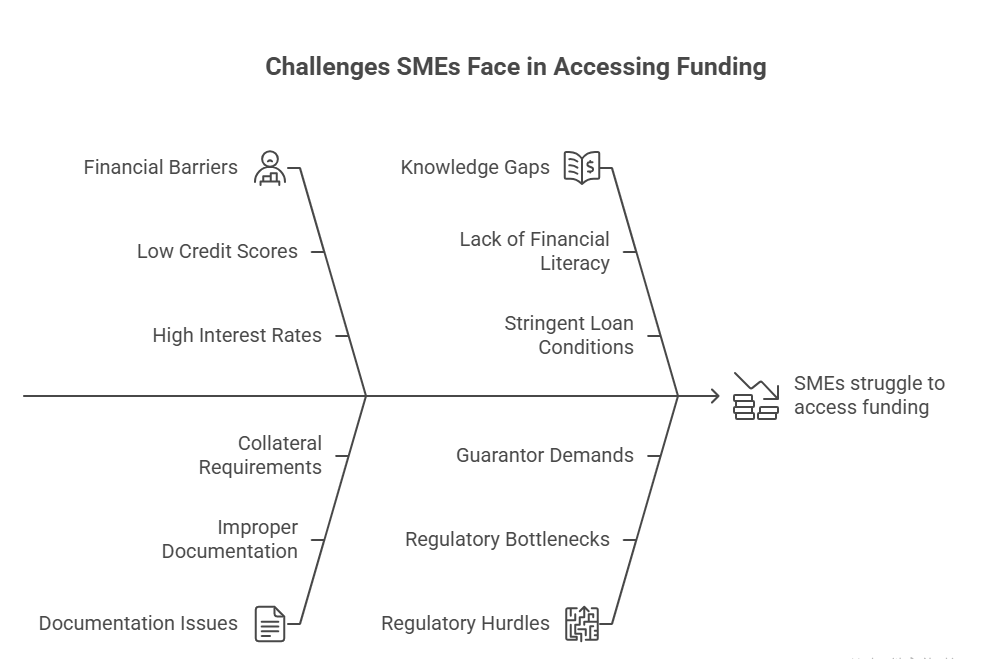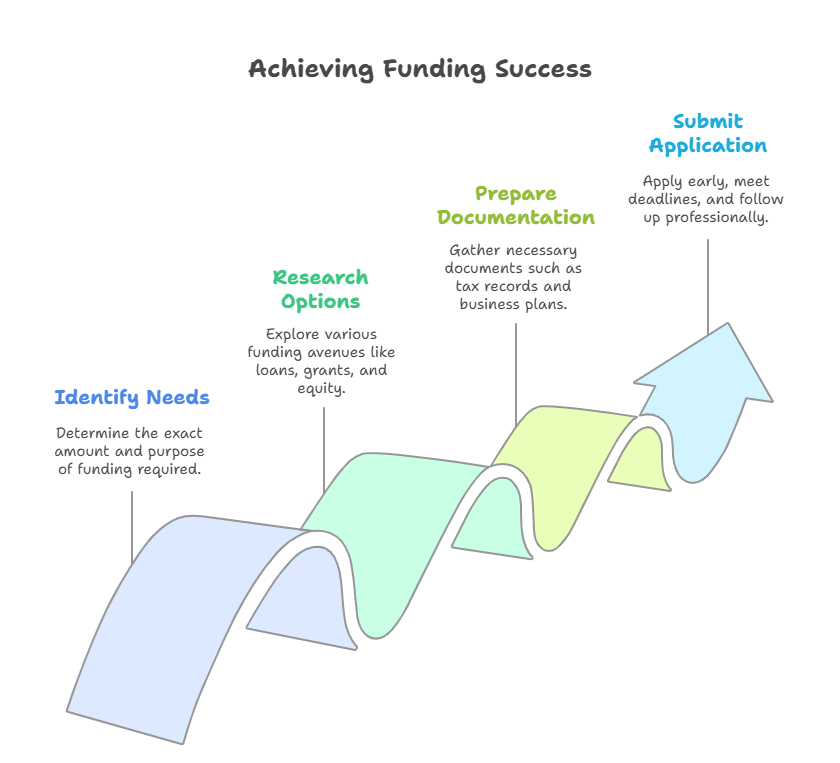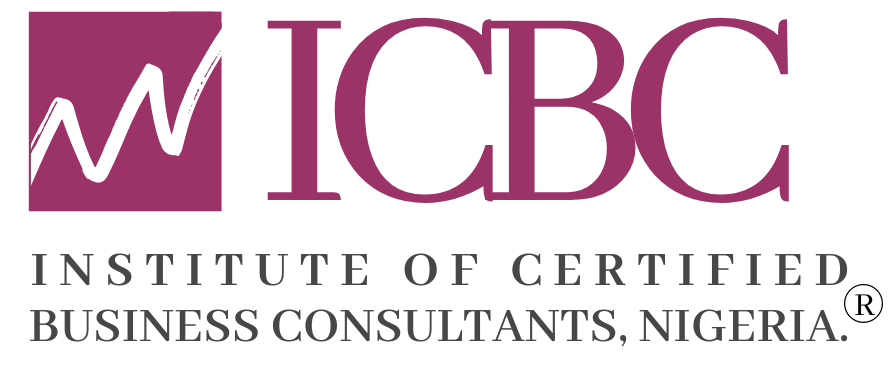Understanding Financing Options for SMEs: Discover Practical Solutions to Fuel Your Growth
Presented by the Institute of Certified Business Consultants (ICBC) Nigeria – June 2025 Lunch & Learn Series
Small and Medium Enterprises (SMEs) are at the heart of Nigeria’s economy, contributing over 90% of all businesses and approximately 48% to the country’s GDP. Yet, despite their importance, SMEs face a major challenge: limited access to funding.
This article explores the types of financing available, outlines common obstacles, and presents practical solutions for SMEs to secure sustainable funding and drive growth.
Key Takeaways
- SMEs make up over 90% of Nigerian businesses and need funding to survive and grow.
- Bank loans, equity, grants, and VCs are just a few financing options.
- Challenges like credit scores and documentation hinder access.
- Preparation is crucial – from CAC registration to business planning.
- Funding is most beneficial when aligned with business growth goals.
Why Business Financing Matters
- SMEs provide over 80% of employment in Nigeria.
- Access to finance enables expansion, innovation, and improved competitiveness.
- Lack of funding has forced many startups to shut down within their first few years.
- Reliable financing allows SMEs to invest in equipment, hire talent, and build sustainable operations.
Available Financing Options for SMEs
Here are the most common financing options for SMEs in Nigeria:
| Financing Option | Description & Advantages | Common Challenges |
|---|---|---|
| Traditional Bank Loans | Offered by commercial, Islamic, and microfinance banks. E.g., Access Bank, Stanbic IBTC. | High collateral, complex application, regulatory bottlenecks |
| Equity Financing | Gives investors ownership in your business. No repayment obligations. | Diluted ownership, possible misalignment of goals |
| Venture Capital | Funding in exchange for equity. Often supports startups with growth potential. | Involves due diligence, investor control, and exit terms |
| Angel Investors | High Net Worth Individuals offer funds and mentorship. | Terms vary, often relationship-dependent |
| Supplier Credit | Short-term credit (30–90 days) to improve cash flow. Often interest-free. | Depends on business trust and credit history |
| Crowdfunding | Raising funds from the public through online campaigns. | Requires digital marketing skills and social proof |
| Government/Development Grants | Grants from agencies like CBN, TEF, World Bank, GIZ, AfDB, and UNDP. | Competitive, requires thorough applications and documentation |
Examples of Funding Opportunities in Africa
- Tony Elumelu Foundation (TEF) – $5,000 seed capital plus mentorship
- African Development Bank (AfDB) – Youth innovation and entrepreneurship trust funds
- World Bank/IFC SME Programs – Ongoing support for small businesses
- GIZ (German Development Agency) – Digital skills, business grants, and advisory support
- UNDP and other UN agencies – Grant and accelerator programs for African SMEs
Key Challenges SMEs Face When Accessing Funding
- Limited access to capital
- High interest rates
- Short repayment windows
- Low credit scores
- Inadequate financial and business documentation
- Lack of awareness or understanding of available options
- Collateral and guarantor requirements
- Regulatory and bureaucratic hurdles

How SMEs Can Prepare for Funding
- Register your business with appropriate regulatory authorities (CAC, FIRS)
- Keep organized and accurate financial records
- Develop and document a clear, investor-ready business plan
- Build a marketing and branding strategy that reflects your value proposition
- Stay updated with trends and regulations in your industry
- Review and implement internal business policies
- Integrate sustainability initiatives to appeal to impact investors
Funding Process: Four Essential Steps
- Identify Your Needs
Assess your financial requirements and define how funds will be used. - Research Funding Options
Explore which types of financing suit your business goals and risk appetite. - Prepare All Documentation
Get your CAC registration, tax IDs, financial statements, and business plans ready. - Submit Your Application
Follow each funder’s requirements and be sure to meet deadlines with complete information.

Practical Solutions for SMEs to Overcome Funding Barriers
- Explore non-traditional or alternative funding options such as microfinance and crowdfunding
- Build and maintain a healthy credit history through financial discipline
- Attend sensitization programs and financial literacy workshops
- Leverage expert guidance from business consultants and advisors
- Join business support organizations for mentorship, funding access, and training
When to Seek Business Financing
- Purchasing equipment or other business assets
- Expanding inventory or fulfilling increased orders
- Meeting short-term cash flow or working capital needs
- Launching new projects or business lines
- Accessing tax incentives through structured debt
- Restructuring or refinancing existing debts
- Fulfilling regulatory or compliance requirements
Quote from the Training
“Funding isn’t just about getting money; it’s about preparing your business to be fundable. The more ready you are, the easier funding becomes.”
— Mimi Nongo, FCA, FICBC, ACCA Affiliate
Conclusion
Accessing financing doesn’t have to be overwhelming. By understanding available options and proactively preparing your business, you can position yourself for long-term success.
The Institute of Certified Business Consultants (ICBC) remains committed to supporting SMEs through practical knowledge-sharing, such as the Lunch & Learn Series.
To learn more about SME financing opportunities or to join the next session, contact ICBC:

